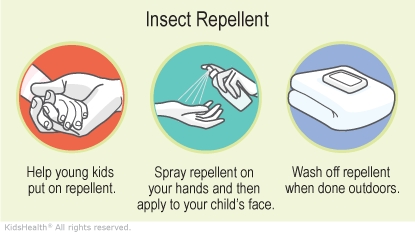How to Use Insect Repellent Safely
Insect (bug) bites often are harmless and cause only itching and redness. But some can cause illness, so parents should to try to protect kids from bites. Insect repellent can help, but it's important to use it safely.


To use insect repellents safely:
-
Put repellent on skin on the arms and legs not covered by clothing.
-
Put repellent on the face by spraying into an adult hand and then wiping it across the forehead and cheeks of the child (away from the mouth and eyes).
-
Don't put repellent on young children's hands because they might put them into their mouths.
-
Don't put repellent on cut or irritated skin.
-
Don't reapply the repellent unless your child gets wet or is sweating a lot.
-
Wash skin with soap and water as soon as kids come back inside to remove repellent.
-
Keep repellent out of the reach of children. Call Poison Control at 1-800-222-1222 if you think your child may have put insect repellent into the mouth or the eyes.


What types of insect repellents are safe for kids? Several insect repellents can be used:
-
DEET in concentrations of 10%–30% is safe to use on children over 2 months old. The higher the concentration, the longer it lasts.
-
Picaridin is available in concentrations of 5%–10% and is safe to use on children over 2 months old.
-
Oil of lemon eucalyptus (made from the leaves of the lemon eucalyptus tree) can be used on children over 3 years old and lasts up to 2 hours.
-
Permethrin is safe for all ages. It can be sprayed on clothing and gear (such as sleeping bags) used by kids, but should NOT be sprayed directly on the skin. The protection can last about a week, even if clothing is washed a few times. Clothing that is sold pre-treated with permethrin should not be worn by children.
What are some other ways to prevent bug bites? To help prevent bug bites:
-
Have your child wear long pants and long sleeves in the woods.
-
Don't let your child wear perfumes or scented hair spray.
-
Avoid areas where insects gather.
-
Try to keep your child inside the house or in screened-in play areas at dusk and dawn, when insects are most active.
-
Use screens on doors and windows. Repair broken or damaged screens.
-
Remove water from gutters, tires, wading pools, and other outside containers because mosquitoes live there. Change water in pet dishes and birdbaths daily.
Do insect repellents keep away bugs that sting? No, they don't keep away stinging insects such as wasps, bees, and hornets. They only keep away biting insects such as mosquitoes, ticks, fleas, biting flies, and chiggers.